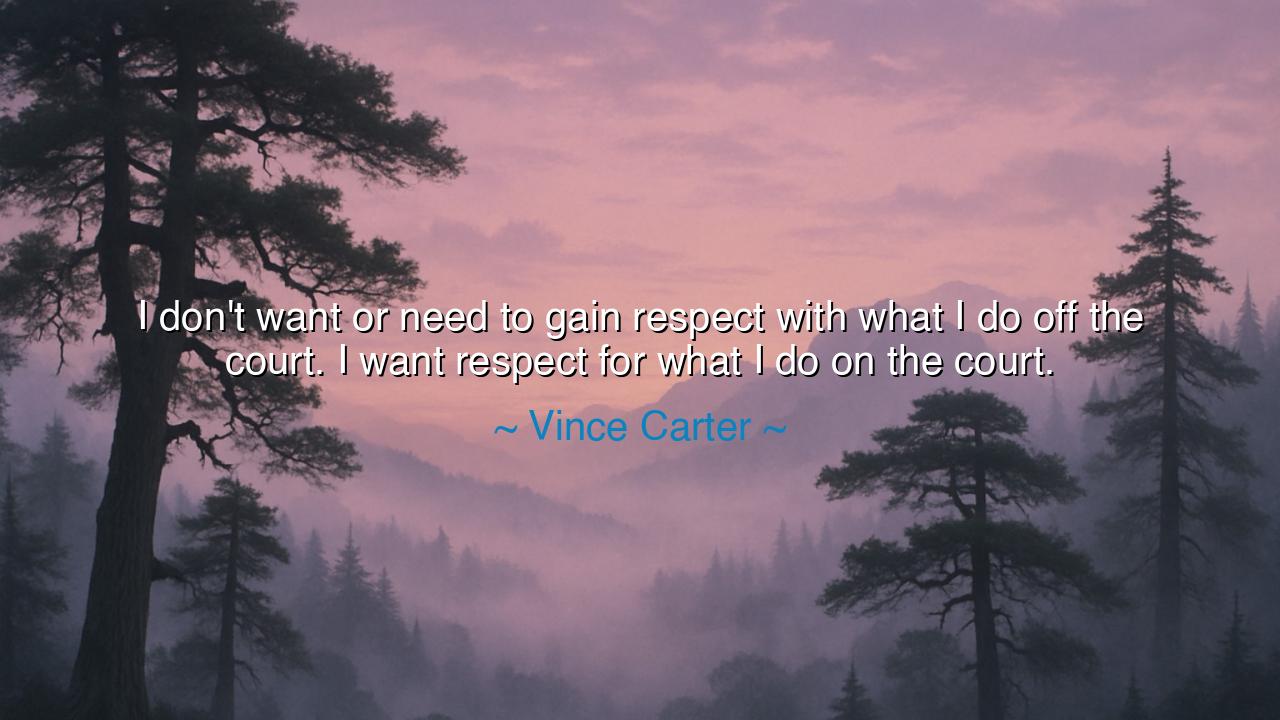
I don't want or need to gain respect with what I do off the
I don't want or need to gain respect with what I do off the court. I want respect for what I do on the court.






In the words of Vince Carter, the legendary athlete whose flight across the basketball court inspired awe across generations, we find a truth that reaches far beyond sport: “I don’t want or need to gain respect with what I do off the court. I want respect for what I do on the court.” These are not the words of arrogance, but of purpose — the declaration of a man who understands the sacredness of craft, the purity of devotion, and the timeless law that true respect is not begged or borrowed, but earned through mastery. His words ring with the discipline of one who has chosen not the path of spectacle or self-promotion, but the path of work — the silent, unseen labor that gives rise to greatness.
The origin of this quote lies in the heart of Carter’s long and storied career, one that spanned over two decades in the NBA, a rare longevity achieved through resilience and relentless dedication. Known in his early years as “Air Canada” for his soaring dunks and grace in motion, Carter was not merely an entertainer — he was a craftsman, a student of the game. As fame and fortune surrounded him, he remained focused on his art: the game itself. In an era when many sought attention beyond the court — through endorsements, controversies, or spectacle — he anchored himself to the principle that true respect is born from excellence in one’s chosen arena, not from the noise that surrounds it.
In saying, “I want respect for what I do on the court,” Carter reminds us of the ancient virtue of integrity of purpose — the idea that one must seek honor through the work itself, not through the embellishments that the world offers. Just as the blacksmith is known by the strength of his blade and the poet by the beauty of his verse, so too the athlete, the artist, and the laborer must be known by the purity of their performance. This is the wisdom of the ancients — that excellence in one’s craft is its own form of prayer, its own proof of worth. The true master does not seek fame, for fame is fleeting; he seeks mastery, for mastery is eternal.
History gives us many examples of this truth. Consider Leonardo da Vinci, who, despite being a man of infinite talents, wrote in his journals, “I have offended God and mankind because my work did not reach the quality it should have.” Though adored by kings, Leonardo cared little for the applause of the world; his respect, like Carter’s, was sought in the perfection of the work itself. Or look to Bruce Lee, who said, “I do not fear the man who has practiced 10,000 kicks once, but I fear the man who has practiced one kick 10,000 times.” Both understood what Carter lives — that the pursuit of respect is not found in showmanship, but in the relentless refinement of one’s art.
There is a quiet honor in restraint that shines through Carter’s words. He acknowledges that while the world hungers for stories beyond the game — the glamour, the scandal, the spectacle — the truest story is told in moments of focus: a well-timed pass, a selfless play, the humility of hard work. Respect, he suggests, must be grounded in authenticity. What a person does when the lights are brightest must reflect the hours they spent in the shadows, training, sacrificing, and building the foundation of their craft. For to seek admiration off the court without earning it on the court is to build castles on sand.
Yet Carter’s quote also carries a deeper moral resonance, one that reaches beyond the realm of sport. It speaks to every person who strives for excellence in their field, whether in classrooms, workplaces, or homes. It teaches that the measure of our worth lies not in the applause we gather, but in the integrity of our labor. The world may honor the loud, but time honors the devoted. Respect, once earned through consistent effort and truth to one’s calling, cannot be taken away; it stands as a monument to character, carved not in stone, but in memory.
So, my children, take this wisdom to heart: let your work speak for you. Do not chase respect; build it, as Vince Carter did, through discipline and dedication. In whatever you do, seek mastery — for the world forgets the boastful, but it remembers the skilled. Do not hunger for recognition beyond your craft; rather, pour your soul into your calling, and let that devotion become your legacy. For the respect that endures is not the kind that is shouted from the crowd, but the kind whispered in reverence long after you are gone.
And when you stand before your life’s court — your place of labor, your field of purpose — remember Carter’s vow. Seek not to impress the world with the noise of your ambition, but to inspire it with the purity of your effort. For in the end, respect is not given by others; it is born within, forged through the ceaseless pursuit of excellence. And that, above all, is the mark of a life truly lived — one that needs no words, for its deeds speak forever.






AAdministratorAdministrator
Welcome, honored guests. Please leave a comment, we will respond soon